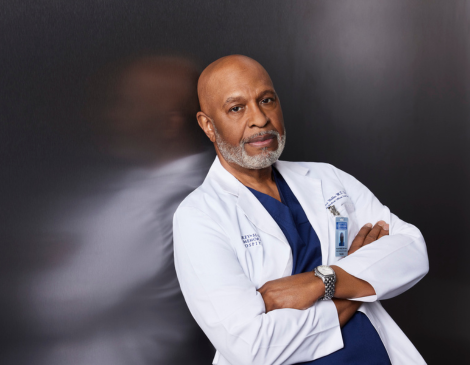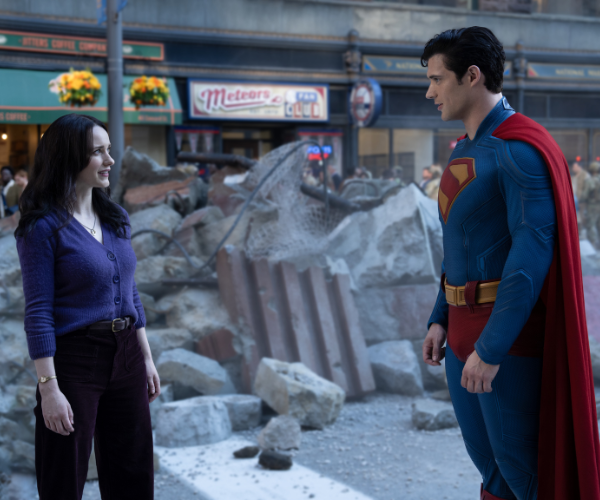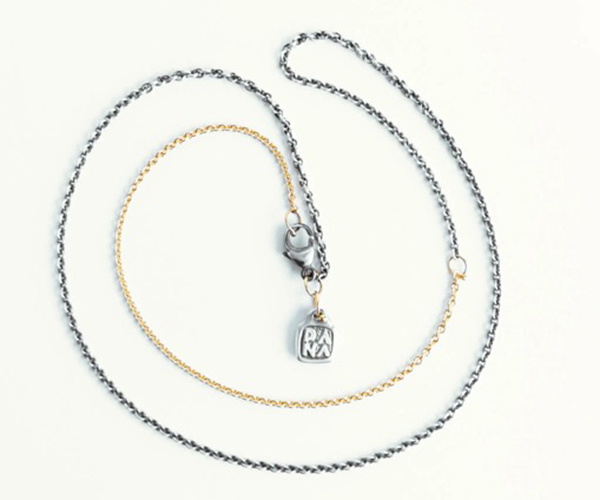"When you become an intern, there's a ceremony where you get your white coat," Dr. Richard Webber says in the first episode of Grey's Anatomy, which aired in the spring of 2005. "Like magic, you're a doctor."
Like TV magic, Grey's Anatomy continues to remain a popular standby on the small screen today, nearly 20 years later.
Ever since that first season of Grey's, ranks of surgeons have come and gone from Grey-Sloan Memorial Hospital, the cast shifting and morphing in the two decades that followed. Just three original main characters — and actors — remain from that first season: Meredith Grey (Ellen Pompeo), Miranda Bailey (Chandra Wilson) and Webber (James Pickens Jr.).
Pickens has been there for every wild storyline of the show, which has featured plane crashes, shootings, car accidents and rare medical diagnoses of every variety. The Cleveland native, who spent some of his early years acting at Karamu House, shared some of his experiences on set and in the O.R. with Cleveland Magazine.
Cleveland Magazine: How does it feel to reach 20 years on Grey’s Anatomy?
James Pickens Jr.: Oh, boy. It's a good question. It's truly been a blessing. I’m full of gratitude. It's one of those jobs that a lot of actors dream of; most of us are very transient as our profession goes — you go from one job to the other. The fact that this one has lasted as long as it has, has afforded me to stay stationary for the most part and to be part of something that's so iconic, both from a popular culture standpoint, but also from a cultural standpoint as well. It's been pretty amazing, and I count myself really lucky. It's such an elite group of shows that have lasted this long.
CM: There aren’t a lot of cast members left from season one — just you, Chandra Wilson and Ellen Pompeo. What does it feel like to be one of the original core of the entire show?
JP: It's been reflective to look back on 2004 when we shot the pilot, with the original nine cast members. To still be here telling stories 20 seasons later, and still be relevant, still be engaged with our audiences — it's been pretty special. Myself, Chandra and Ellen — to still want to tell these stories has been pretty gratifying.
CM: Some episodes of Grey’s Anatomy do get pretty wild; there are a lot of twists and turns in everybody’s storylines. What are some memorable moments that stand out for you that come to mind when you’re reflecting on your time on the show?
JP: Oh, wow, there's so many. I mean, every show is a microcosm of a bigger intent in the storytelling — but, shucks. I’m trying to think — probably season two, the code black episode [“It’s the End of the World”] was probably one that was probably the most watched, in the 20 seasons. It aired right after the Super Bowl that year. That one, oh my gosh, the active shooter was one that was very memorable. There are so many great moments. When I was electrocuted, [“Perfect Storm”] that one, yeah. The one when Bailey had her baby [“As We Know It”]. Those, I just kind of pulled out of thin air because they just popped in my head, but there have been many.
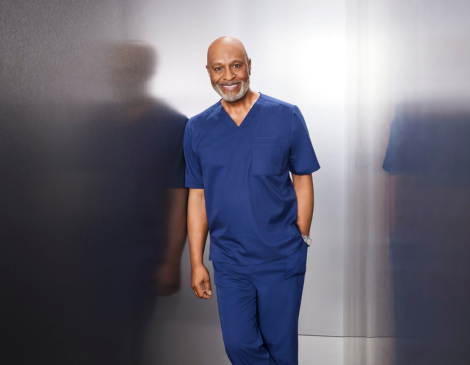
(Photo courtesy Disney/Nino Muñoz))
CM: I’m curious about what it’s like to play a doctor for so long. How have you studied your character over time? How have you developed Dr. Richard Webber into reality on the show?
JP: I always approached Dr. Webber as medicine was his profession, but he was much more than the sum total of its parts. It was a man who was slow, multifaceted, and with that comes a certain responsibility. Ellis [Grey]’s background comes into play; his struggles with alcoholism; losing Ellis early on, and then Loretta Devine’s character [Adele Webber] from Alzheimer's.
In approaching the medical side of it, we were very fortunate to have some doctors who would provide their services for the show and give insight — their experiences in the world that they live in. I was really fortunate to develop some relationships with one in particular, Dr. Allan Hamilton. It's just so amazing and he mentored me through a lot of things outside of the show, actually. You know, we’ve done over 400 and some odd episodes now, and you start to glean a little bit of terminology.
At the end of the day, you rely on this great writing team to make you look good. So that was a combination of an amazing medical team that's part of our staff, med tech producers Linda Klein and Michael Metzner — they make us look good. At the end of the day, they’re the real stars of the show.
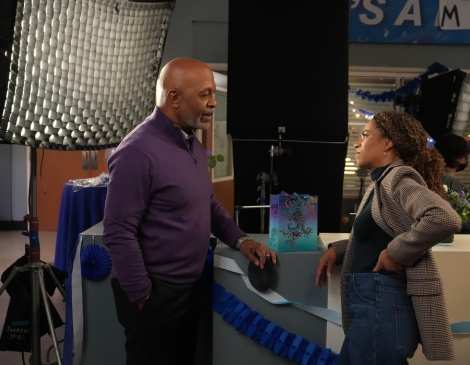
(Photo courtesy ABC/Eric McCandless)
CM: Before all of this, you grew up in Cleveland. What neighborhood did you live in? What was your childhood like here?
JP: It was a great childhood. I first started out over on the East Side; I was right off Wade Park Avenue on East 92nd Street. 1477 East 92nd; the building is no longer there. I went to school right across the street from where I lived, Daniel E. Morgan Elementary School, and then I transitioned to Harry Davis Junior High, and then finally went to high school at the old East High School, which has been gone for quite a while.
It was great growing up there. My dad worked for Republic Steel for many years. My mom was a stay-at-home mom, a homemaker. It was a great place to grow up. I still have relationships with some people that I bet go back to the late ‘50s.
I was one of three children. I was the oldest; it was myself, my brother, my sister. Unfortunately, we lost our brother two years ago, but my sister still lives there. All of my nieces and cousins and nephews are still there. I think I was the only one who said, ‘I had to move on,’ but it was a great place to live at that time. It's just a vibrant city. It’s one of the main port towns along Lake Erie — the great sports teams. We’d used to go to beaches, Geauga Lake, Cedar Point back in the day. Some great amusement parks. Rockefeller Park that we could walk to, it was a great place to go.
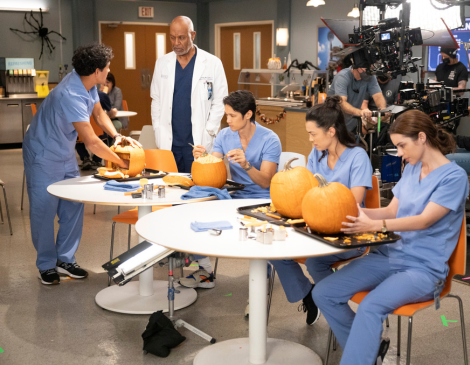
(Photo courtesy ABC/Liliane Lathan)
CM: You started acting at Karamu House. What shows were you involved in there? Do you remember some of your roles?
JP: Oh, my goodness. Yeah, I started out there as a stage manager with a little play called Devil Mas, written by a playwright named Lennox Miller. Karamu’s always been known for the children's theater, so I transitioned and I started working in the children's theater and doing small productions for younger audiences. From there I did a play called Short Eyes, it was written by Miguel Piñero, it got quite a bit of critical acclaim when it was done in New York, directed by the late Chris Colombi. I played a character named Cupcakes, who’s in jail.
From there, I did The Great White Hope, which, actually, Chris Colombi’s sister, Lucia, directed. I played character named Scipio; I remember, vividly, they created platforms on the stage and she had me swinging from one platform to another, like I was some kind of Tarzan character or something. It was pretty crazy, looking back on it.
We had one play called Living Fat that was very, very successful for Karamu at the time — it was a comedy that the wonderful Margaret Ford-Taylor directed. It got a lot of attention; we had a good time.
It was a great two-and-a-half or so years that I spent at Karamu. It was invaluable, and really helped to shape where I wanted my career to go.
CM: Sounds like a very busy two-and-a-half years.
JP: It was, yeah — and I loved every minute of it.
CM: Do you remember the moment when you were inspired to pursue acting?
JP: I never intended on doing this professionally, believe me. Now we’re looking at 46, 47 years ago that I’ll be doing this now. I actually trained to be an artist; I wanted to be a cartoonist and illustrator. Long story short, my senior year of college, I happened to be in a student union and there was a gentleman who was working on his doctorate in directing. He was looking for an actor to cast into a play he had to direct, and he couldn’t find anybody. We happened to be in the same place at the same time, at lunch with about 500 people in the student union. He was with a mutual acquaintance, and he happened to be telling her his dilemma, and she perused the room and happened to see me, and said, “Why don’t you ask Jim?”
He came over and introduced himself, and what he was doing, and I was very reticent at the time; I happened to have been dating a young lady who had acted before, and she said, “Give it a try.” She was convincing, and I acquiesced and said, “Sure,” and once I stepped on the stage, it opened up a whole new world for me. As they say, the rest is history.
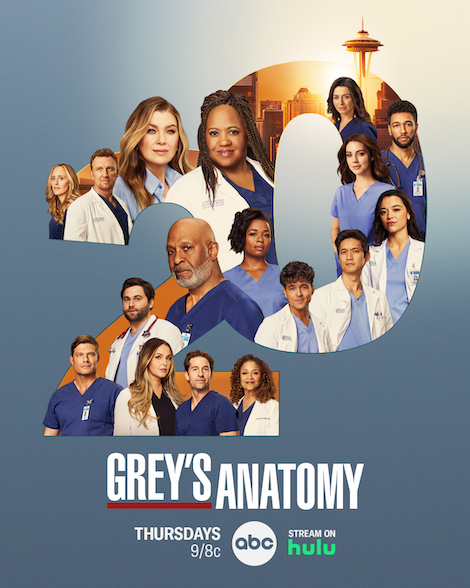
(Photo courtesy Disney)
CM: Here we’re reaching the end of the 20th season of Grey’s Anatomy. I’m wondering, what about the next 20 years of the show, should we expect to keep seeing you?
JP: Oh my gosh, I hope not the next 20 years. [Laughs.] You know, it’s been such a great, great ride and we’ll play it out until they turn the lights out in the or for the last time. I’m looking forward to telling some more stories, looking forward for my character to transition to the next phase of his life and career. And that’s what makes what we do so engaging and so much fun, is to watch the progression of characters and how they integrate themselves, and the stories that are being written and told — what better way to do it than in the framework of a show that’s been so successful for so long? I'm really, really excited. I’ve been really proud to be a part of it.
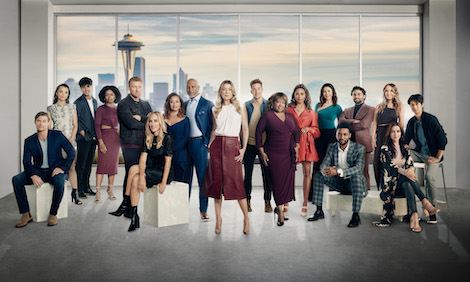
For more updates about Cleveland, sign up for our Cleveland Magazine Daily newsletter, delivered to your inbox six times a week.
Cleveland Magazine is also available in print, publishing 12 times a year with immersive features, helpful guides and beautiful photography and design.

